In the realm where the mind meets the body, a fascinating question has emerged from recent research: how mental health can impact physical health including formidable adversaries like cancer, diabetes, and heart disease?
The answer, as experts delve into this intricate nexus, reveals a complex interplay between the psychological and physiological realms.
As the lines blur between mental health and its profound influence on the body’s well-being, the medical research community has begun to probe deeper into this relationship.
Understand How Mental Health Can Impact Physical Health
The growing prevalence of disorders such as depression and anxiety has spurred curiosity about their potential impact on an individual’s physical health.
Dr. Sadeer Al-Kindi, a cardiologist who has delved into this subject, underscores the significance of this inquiry. “Given the sheer number of individuals grappling with these disorders, there’s a burgeoning interest within the medical research community to comprehend how they might intricately intertwine with a person’s physical well-being,” he shares in an email conversation with UPI.
The intriguing nexus between mental health and physical health is exemplified by the mounting evidence that has surfaced.
Dr. Al-Kindi, practicing at University Hospitals Cleveland Medical Center in Houston, highlights that anxiety and depression are gradually being recognized as risk factors for cardiovascular diseases like heart attacks and strokes.
This revelation underscores the far-reaching impact of mental health on the body’s overall health, calling attention to the complex connections between seemingly distinct domains.
Researchers are peering into the intricate web of mechanisms that might link mental health to physical maladies.
A study published in JAMA Psychiatry in 2020 unraveled a potential association between mood disorders and certain physical conditions. The research indicated that depression might be linked to a higher risk of autoimmune diseases, while anxiety could be associated with an elevated risk of Type 2 diabetes.
The significance of these findings resonates deeply, hinting at a potential bridge between psychological struggles and physiological responses.
However, the relationship between mental health and physical health isn’t one-dimensional, and experts caution against oversimplification. While emerging evidence suggests a connection, it’s important to recognize the nuanced factors that contribute to this interplay.
Stress, often a common companion of mental health disorders, can unleash a cascade of physiological responses that impact the body.
Elevated stress levels have been linked to inflammation, which, when chronic, can lay the groundwork for an array of health issues, including heart disease, diabetes, and even cancer.
The intricate nature of the mind-body relationship prompts the consideration of a two-way street.
Just as mental health can influence physical health, the converse is equally true. Individuals grappling with chronic illnesses or facing physical challenges may experience a decline in their mental well-being.
The physical toll that diseases like cancer or diabetes exact can manifest as psychological distress, contributing to feelings of anxiety, depression, and diminished quality of life.
As the understanding of this relationship deepens, medical professionals are advocating for a holistic approach to health that bridges the gap between mental and physical well-being.
Recognizing the intricate web of connections between the mind and body, healthcare practitioners are increasingly integrating mental health assessments and interventions into the continuum of care.
This approach acknowledges that mental health isn’t an isolated entity but an integral aspect of a person’s overall health.
While the question of whether people can “think themselves sick” remains complex and multifaceted, the emerging insights from research underscore the undeniable links between mental and physical well-being.
The conversation around health is evolving beyond the separation of mind and body, recognizing that each facet influences the other in profound ways.
As researchers continue to delve into this intricate interplay, the medical field is poised to embrace a more comprehensive and integrated approach to healthcare that encompasses the holistic needs of individuals.




























